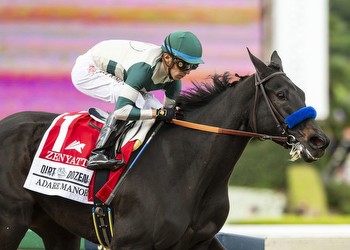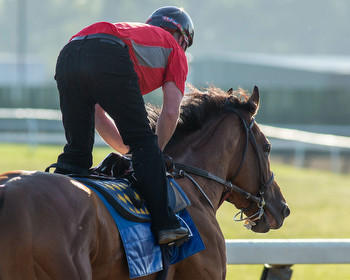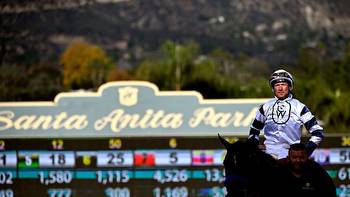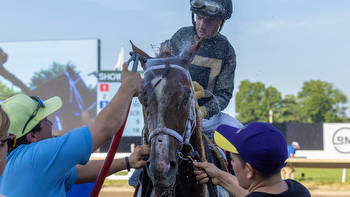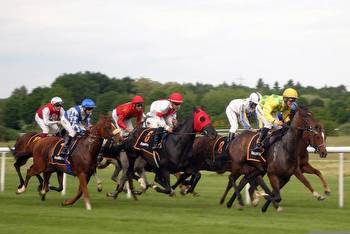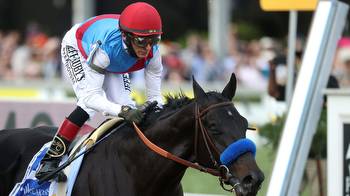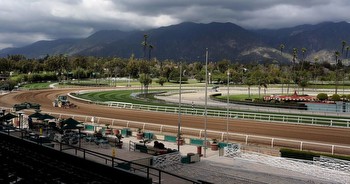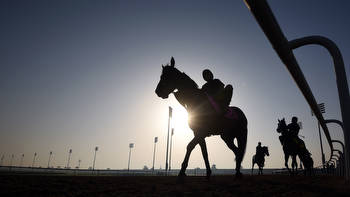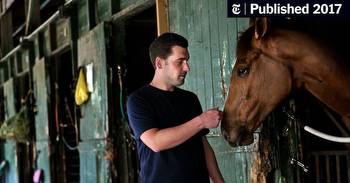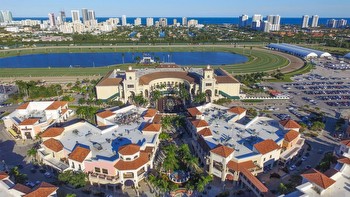Kentucky Derby 2021: What happens to racehorses when they retire?
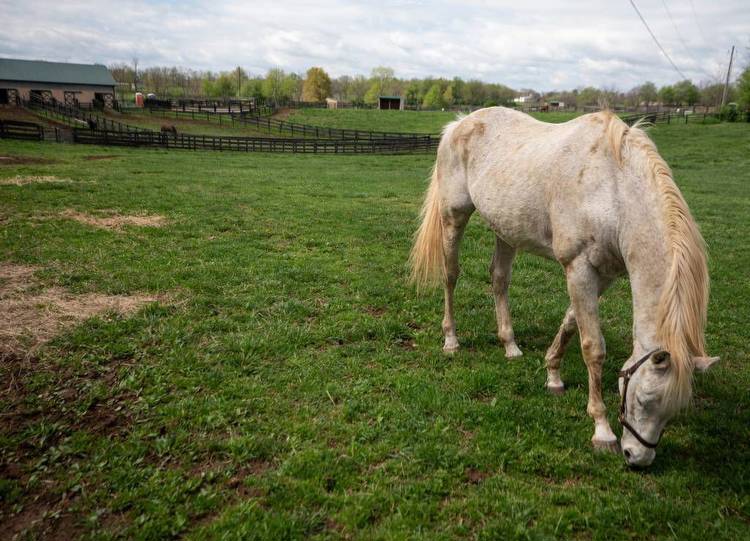
Horses are unique athletes for the pretty obvious reason that they are not humans. Their careers will end just like any other athlete’s, but racehorses can’t exactly become analysts or businessmen when they retire.
Horses also retire much earlier in life than human athletes; the average Thoroughbred lives between 25-28 years, but most racehorses retire when they are much younger.
So, what happens to horses when their racing days are over? It depends on their competitive success and who is looking after them, but here are some of the options:
Breeding
Most successful retired racehorses live out their second chapter on breeding farms. The goal is to breed the next big winner, so a horse’s lineage, speed and track record are closely considered.
Some notable horses like the legendary Seabiscuit don’t find success as breeding stallions, but 2015 Triple Crown winner American Pharoah has already sired several proven winners.
Only horses registered in the Jockey Club can race, and one of the club’s rules bans horses born via artificial insemination or embryo transfer from competing. Because of this, stallion farms play a crucial role in maintaining the sport of horse racing.
New activities
Some horses stay active and in work after their racing careers. According to the Retired Racehorse Project, most horses sold to new owners are used as riding horses.
Those who are still spry and have some agility can even stay in timed competitions like show jumping, the combined sport of eventing and barrel racing. Some will head into the dressage ring or take to the trails as trail riding horses.
Still, other horses (like 2009 upset winner Mine That Bird) will live out their days on ranches, guiding and controlling livestock.
Resources
There are several programs that help find new homes for retired Thoroughbreds. The Thoroughbred Aftercare Alliance evaluates organizations looking to take in transitioning racehorses and provides grants to those it approves.
Another placement facilitation resource is the Retired Racehorse Project. Its goal is to increase “demand for them in equestrian sports and serving the farms, trainers, and organizations that transition them.” One of their most well-known initiatives is the Thoroughbred Makeover, a competition that encourages equestrians to retrain retired racehorses and prepare them for new careers.
There are also organizations that take in former racehorses with the goal of preparing them for second careers. The Secretariat Center in Lexington, Ky., is a prime example of a reschooling organization. The center houses 10-20 Thoroughbreds at a time and “provides education for former racehorses to move on to new careers.” The center prioritizes teaching many skills so that horses can match with many potential adopters.
Watch the 147th running of the Kentucky Derby on Saturday, May 1 from 12 to 2:30 p.m. ET on NBCSN and from 2:30 to 7:30 p.m. ET on NBC. Full coverage is also available on NBCSports.com and the NBC Sports app.
HALLANDALE BEACH, Fla. – After seven Pegasus World Cup events, it’s evidently time for change.
1/ST Racing, which has hosted the entirety of the Pegasus series to this point at Gulfstream Park, is planning for two Pegasus days in 2024 – one at Gulfstream and the other at Santa Anita. Details aren’t finalized and it’s unclear how it would fit in the racing calendar, but 1/ST is planning for both dirt and turf Pegasus races as part of the Santa Anita program.
Gulfstream played host to the $3 million Pegasus World Cup Invitational on the dirt Saturday, along with the $1 million Pegasus Turf and the $500,000 Pegasus Filly and Mare Turf.
“I’d really love to see that we bring it to the West Coast,” 1/ST President and CEO Belinda Stronach said. “That will probably happen in 2024. What we did this year for 2023 was said, `OK, we have a number of great race days, let’s coordinate those better and call it the 1/ST Racing Tour and recognize great achievements within our own footprint.”
Saturday marked the first stop on that new 1/ST Racing Tour. Along with some of the biggest race days at 1/ST tracks – like Florida Derby day at Gulfstream on April 1, Santa Anita Derby day on April 8 and the Preakness Stakes at Pimlico on May 20 – there are a pair of days where the tour will be running simultaneously.
This coming Saturday, Gulfstream will play host to the Holy Bull while Santa Anita has the Robert B. Lewis – both of them Kentucky Derby prep races.
And on March 4, Gulfstream has the Fountain of Youth, another major Derby prep, while San Anita has the Big Cap. Plans call for coordinated post times at those two tracks on those days to provide the best racing action every 20 minutes, as well as some unique betting options.
“We can never rest on our laurels,” Stronach said. “We have to keep moving forward. We have a great team that’s really committed.”
The main Pegasus race is one of the biggest-paying races in North America. Art Collector claimed about $1.8 million from a $3 million purse with his win on Saturday. In 2022, only the $6 million Breeders’ Cup Classic and $4 million Breeders’ Cup Turf featured bigger prizes among U.S. races, and the $3 million Pegasus purse is equal to the one offered last year at the Kentucky Derby.
Regardless of what happens with the Santa Anita plan for future Pegasus events, Stronach insisted Gulfstream will continue having Pegasus days. There has even been talk about Gulfstream playing host to Breeders’ Cup races again, something that hasn’t happened since 1999.
“This is staying here in Miami,” Stronach said. “Pegasus has a home here in Miami. We can’t move Pegasus from Miami. We have great partners here and it’s more than just a day now. We have deep roots here in Miami.”
Bob Baffert can once again enter horses at New York’s major tracks.
The Hall of Fame trainer’s one-year ban by the New York Racing Association ended Wednesday, allowing him to enter horses as soon as Thursday.
“I was disappointed they even did it, but it’s water under the bridge,” Baffert told The Associated Press by phone.
He was suspended last June for repeated medication violations, although none of them occurred in New York. He was barred from Aqueduct, Belmont and Saratoga. A panel credited Baffert for time served for an initial suspension, which allowed him to return this week.
Aqueduct is currently holding its 44-day winter meet that runs through March 26. Baffert doesn’t typically run horses this time of year in New York; he targets the biggest stakes races at Belmont in the spring and Saratoga in the summer.
Baffert remains under a two-year ban by Churchill Downs Inc., which sidelined him after Kentucky Derby winner Medina Spirit tested positive for a substance that is not allowed on race day. The penalty expires shortly after the Kentucky Derby in May. However, Baffert is fighting the suspension in federal court.
The Southern California-based trainer has a big weekend coming up around the country, although not in New York.
He has horses running at three tracks on Saturday.
Defunded is entered in the $3 million Pegasus World Cup at Gulfstream in Florida, where Baffert assistant Jimmy Barnes will be on hand.
Arabian Knight goes into the $750,000 Southwest Stakes as the early favorite at Oaklawn in Arkansas. Baffert has won the Kentucky Derby prep race a record-tying five times and will travel to Hot Springs to watch the 3-year-old colt.
“It’s going to be a good test for him. The only way to find out is to run him long,” he said. “It’s going to take a superior horse to do that and I’m hoping that he is.”
The Southwest offers Kentucky Derby qualifying points to the top five finishers. Arabian Knight won’t receive any points regardless of his placing because of Baffert’s Derby ban.
Hopper will run in the $200,000 San Pasqual Stakes on Saturday at Santa Anita.
On Sunday at the same track, Baffert has entered four of the five horses set to run in the $200,000 San Vicente Stakes for 3-year-olds.

